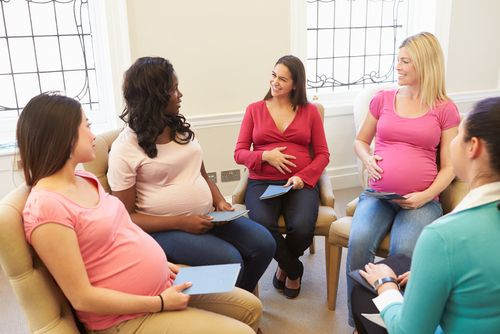Why Do Most Friends From High School Have Babies At The Same Time? Because It’s Contagious

You've probably caught a contagious flu bug from a friend before, but have you ever heard of a contagious baby bug? Apparently, this is a condition where the primary symptom is an urge to have a child if your friend has recently had one. And according to a new study, having children — much like having the flu — is contagious among young adult friends from high school. Entitled, "Does Fertility Behavior Spread among Friends?," the study is based on data from the National Longitudinal Study of Adolescent Health in the United States. It will be published in the June issue of the American Sociological Review, according to a press release Thursday.
"The study shows the contagion is particularly strong within a short window of time: it increases immediately after a high school friend gives birth, reaches a peak about two years later, and then decreases, becoming negligible in the long-run,” said study co-author Nicoletta Balbo, a postdoctoral fellow at the Carlo F. Dondena Centre for Research on Social Dynamics at Bocconi University in Italy.
The study shows that the desire for progeny not only stems from individual preferences and characteristics, but being from part of a moderately close-knit group of friends. “High school friends impact our lives well after graduation," said Balbo. "We know that friends influence each other on many behaviors, such as smoking, drinking, and how much we exercise [...] several sociological theories have proposed social influence as an important factor for shaping fertility choices, and a limited number of studies have demonstrated that such a connection exists among relatives and co-workers. But we believe our study is the first to show this type of connection among friends."
Balbo and co-author Nicola Barban, from University of Groningen in the Netherlands, have studied data on more than 1,700 American women who were tracked from age 15 to age 30. Their research was solely focused on finding the impact that women with kids had on the birth of their high school friends’ children. So only planned pregnancies were considered. The median age of women during the birth of their first child was approximately 27.
Friends With Better Lives?
Balbo gave three possible explanations as to why women were influenced to have kids of their own when they saw their high school friends with babies. “First, people compare themselves to their friends. Being surrounded by friends who are new parents makes people feel pressure to have kids as well," she said. "Second, friends are an important learning source. Becoming a parent is a radical change. By observing their friends, people learn how to fulfil this new role. Lastly, having children at the same time as friends may bring about many advantages — friends can share the childbearing experience and thus reduce the stresses associated with pregnancy and childrearing. It's also easier for people to remain friends when they are experiencing parenthood at the same time."
Barban also explained why the desire for children in women peaks only two years after a friend has given birth and then eventually decreases. "It takes time to have a child — because there is a natural period before conception and because the desire to have a child develops over time," said Barban. "As a result, the effect of a friend giving birth is not immediate. If we had observed an immediate effect, we would have concluded that, rather than being influenced by each other, friends just decide to have children at the same time."



























